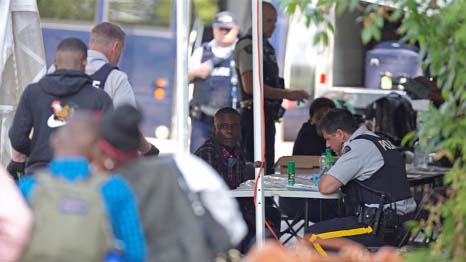
Al Jazeera News :
Canadian and US officials have remained tight-lipped about possible plans to alter a bilateral agreement that would make it harder for asylum seekers to enter Canada from the United States.
Earlier this week, Reuters news agency reported that Ottawa is seeking to expand an agreement with the US to allow it to turn back thousands of asylum seekers at all points along the countries’ shared border.
Thousands of migrants have entered Canada irregularly since early last year, cutting across snowy fields or through ditches to apply for asylum.
The possibility that Ottawa will make it tougher on asylum seekers has raised concerns among rights groups and legal experts in Canada, who have long called on the government to suspend the Safe Third Country Agreement (STCA). “It’s not about deepening the reach of the agreement; we think it should be entirely lifted,” Alex Neve, secretary-general of Amnesty International Canada, told Al Jazeera.
Under the STCA, people can only make a refugee claim in the first country they land in. In other words, a person who is already in the US can’t go to an official border crossing to make an application for refugee status in Canada. A loophole in the deal, however, allows anyone who is already on Canadian soil to file for refugee status. That has pushed thousands of people to enter Canada at unofficial points of entry along the border.
In 2017, Canada’s federal police intercepted more than 20,500 asylum seekers walking across the border without visas, 91.5 percent of whom entered in the province of Quebec.
Neve said the deal should be lifted since the US isn’t “a safe partner for refugee protection”, especially under the Donald Trump administration, which he said has dramatically worsened the conditions for refugees and migrants there.
Many of the new arrivals to Canada cited fears of deportation, detention or other human rights abuses in the US as their reason for heading north. “In many respects, there’s an assault on the rights of refugees and migrants under way in the United States,” Neve said. “In that context, for the Canadian government to be looking at ways which make it harder and harder for fearful refugees in the United States to look instead to Canada as a place of protection is very worrying.” Canada has denied it is considering turning the entire border into a point of entry.
A spokesperson for Canada’s minister of public safety said that “would create a 9,000-kilometre issue that would be more difficult to deal with and potentially more dangerous”.
“It would incentivise people to cross at more remote locations and to evade detection by Canadian law enforcement so they can get to an inland immigration office and make a claim there,” Scott Bardsley told Al Jazeera in an email.
Canadian and US officials have remained tight-lipped about possible plans to alter a bilateral agreement that would make it harder for asylum seekers to enter Canada from the United States.
Earlier this week, Reuters news agency reported that Ottawa is seeking to expand an agreement with the US to allow it to turn back thousands of asylum seekers at all points along the countries’ shared border.
Thousands of migrants have entered Canada irregularly since early last year, cutting across snowy fields or through ditches to apply for asylum.
The possibility that Ottawa will make it tougher on asylum seekers has raised concerns among rights groups and legal experts in Canada, who have long called on the government to suspend the Safe Third Country Agreement (STCA). “It’s not about deepening the reach of the agreement; we think it should be entirely lifted,” Alex Neve, secretary-general of Amnesty International Canada, told Al Jazeera.
Under the STCA, people can only make a refugee claim in the first country they land in. In other words, a person who is already in the US can’t go to an official border crossing to make an application for refugee status in Canada. A loophole in the deal, however, allows anyone who is already on Canadian soil to file for refugee status. That has pushed thousands of people to enter Canada at unofficial points of entry along the border.
In 2017, Canada’s federal police intercepted more than 20,500 asylum seekers walking across the border without visas, 91.5 percent of whom entered in the province of Quebec.
Neve said the deal should be lifted since the US isn’t “a safe partner for refugee protection”, especially under the Donald Trump administration, which he said has dramatically worsened the conditions for refugees and migrants there.
Many of the new arrivals to Canada cited fears of deportation, detention or other human rights abuses in the US as their reason for heading north. “In many respects, there’s an assault on the rights of refugees and migrants under way in the United States,” Neve said. “In that context, for the Canadian government to be looking at ways which make it harder and harder for fearful refugees in the United States to look instead to Canada as a place of protection is very worrying.” Canada has denied it is considering turning the entire border into a point of entry.
A spokesperson for Canada’s minister of public safety said that “would create a 9,000-kilometre issue that would be more difficult to deal with and potentially more dangerous”.
“It would incentivise people to cross at more remote locations and to evade detection by Canadian law enforcement so they can get to an inland immigration office and make a claim there,” Scott Bardsley told Al Jazeera in an email.

